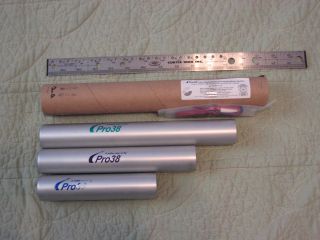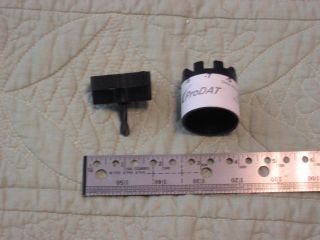Cesaroni Technologies Pro38 Motors
Cesaroni Technologies - Pro38 Motors {Motor}
Contributed by Lance Alligood
| Construction Rating: | starstarstarstarstar |
| Flight Rating: | starstarstarstarstar |
| Overall Rating: | starstarstarstarstar |
| Manufacturer: | Cesaroni Technologies  |
Brief: Construction: Each casing can only be used with the motor reload that has the same length (e.g., the 2-grain motor must be used in the 2-grain casing). And the only way the motor will work as designed is in the appropriate casing (more on that later). The 1-grain casing uses motors in the G thrust range, the 2-grain casing use Hs, the 3- and 4-grain casings are for Is, and the 5- and 6-grain casings are for Js. Another benefit of the casings is that they are only one piece of machined aluminum tubing--there are no O-rings, snap rings, nozzles, or closures to keep track of, misplace, damage, or lose. The entire reload assembly threads into the casing. The Classic propellant is comparable to AeroTech's White Lightning--a nice white hot flame with a respectable amount of white smoke. The Smokey Sam has an appearance close to AeroTech's BlackJack propellant, consisting of dense black smoke and little or no flame but has a faster burn rate and higher thrust curve than the BlackJack propellant. White Thunder is a fairly new formula and is currently only available in the 5-grain size (I540) and is about as close as you can get to a full I (632 of 640Ns). It has a much higher thrust rate and shorter burn time but visually it is pretty much identical to the Classic propellant. It is my understanding that the White Thunder propellant was designed with bowling ball lofts in mind (and to compete with the AeroTech I600R). The biggest advantages to the Pro38 motors are ease of prepping and clean up, reliable and fast ignition (which makes it a great choice for HPR clustering, staging, and airstarts), and the ejection delays are adjustable to fit almost any rocket. Unlike some other 38mm motor manufacturers, the Pro38 motors are in strong supply so there shouldn't be much trouble in acquiring reloads, casings, or ProDAT tools from HPR vendors. For all of these reasons, it makes the Pro38 motors an excellent choice for Level 1 and 2 certification flights because of the inherent simplicity and reliability. However, there is a price that comes with all of this convenience, and that is perhaps the Pro38's biggest disadvantage: price. Reloads (particularly the 1-grain reloads) are generally priced several dollars more than comparable thrust AeroTech reloads although that difference becomes negligible by the time you get up to the 5- and 6-grain reloads. Also, there are only 2 different propellant formulas so there are less visual effects available than other manufacturer's motors on the market, plus the Smokey Sam motors require a LEUP since the grains are slightly larger (64.5g) than the current BATF regulation (62.5g) for propellant not requiring one.
Prepping the reload is almost as easy as using a single-use motor. Regardless of what size reload you are wanting to use, the process is identical. When handling the reload, there should be an ignitor (an electric match) taped to the outside of the tube. Remove and set it aside. Open the tube and remove the reload. First, we need to set the delay. The delay grain comes with a delay time preset. Often this will be too long a delay for your rocket. You can shorten the delay by using the ProDAT tool, which is a hand drill-like apparatus compatible with all of the Pro38 reloads that will remove a set amount of delay time in increments of 3, 5, 7, or 9 seconds from the delay. For instance, with the 244H153-13A 2-grain Pro38 reload, there is a max delay of 13 seconds. It can be shortened to 10, 8, 6, or 4 seconds. You remove the delay element by pulling on the end of the reload. The ProDAT tool is set to the amount of time you want to reduce from the element and twist it clockwise into the grain until a smooth hole is drilled into the center. Once set, press the delay element back in the black plastic reload until firmly held in place with the O-ring.
Pro38 motors by Cesaroni are arguably the easiest MPR (1-grain only) and HPR (2- to 6-grain) motors available on the market today. The "38" in Pro38 means that they are 38mm diameter motors. You could go so far as to call them a reloadable motor system (RMS) that are practically single-use motors with adjustable delays.
There are 6 different length casings (dependant on the number of grains in each motor) available and 3 different propellant formulas: Classic, Smokey Sam, and White Thunder. All motors come with delay grains that can be adjusted (shortened) with the ProDAT tool.
 It only gets easier from here folks! Slide the entire reload into the casing and screw into place. Load the motor into the rocket! That's it for prepping the motor...
It only gets easier from here folks! Slide the entire reload into the casing and screw into place. Load the motor into the rocket! That's it for prepping the motor...
As far as retaining the motor, you should be able to use the same method with any other 38mm solid fuel rocket motor on the market. I have used the Pro38s successfully on rockets with masking tape (friction fit), Kaplow clips, and Aero Pack retainers.
Once the rocket is in an approved location or launch pad, it is time to insert the ignitor. Remove the yellow cap from the reload. Open the small plastic bag with the e-match and straighten the wires. There is plenty of lead for hooking up the ignition clips. One end of the wires has an orange sleeve and the other end has a white sleeve. Slide the white sleeve towards the middle of the leads (~18-24") to expose the e-match. Slide the yellow cap over the e-match. Insert the e-match into the motor as far as it will go. The Pro38 motors have a small pyrogen layer at the topmost part of the forward grain which will ignite the propellant. It is necessary for the ignitor to be in contact with that pyrogen for proper ignition! When the ignitor is fully inserted, at the base of the motor, wrap the ignitor around your finger to create a loop in the wire. Slide the yellow cap forward until it clips onto the motor nozzle. The loop in the wire prevents the ignitor from slipping out of the motor. Remove the orange sleeve to expose the bare copper wire, hook up the ignitor clips (I like to wrap all of the exposed copper around the clips to ensure contact), do a continuity check, and get ready for blast off!
Finishing:
Regarding post-flight activity, the great "finish" of Pro38 motors is that they require almost zero cleaning after use! Simply unscrew the grain from the casing and throw away the black plastic sleeve! You may (or may not) need to wipe off the outside of the forward end of the casing with a damp cloth to remove any ejection charge residue. Using the casing multiple times in one day at the field is incredibly easy to do without any hassle.
PROs:
- Easy to prep and clean up
- Reliable, fast ignition
- Great motor choice for complex HPR flights (clusters, staging, and airstarts)
- Adjustable delay with ProDAT tool
- High product availability
- Simplicity in design makes for a great choice to use in certification flights
CONs:
- Requires a casing for each of the 6 reload sizes
- Only 3 propellants available
- Smokey Sam reloads require LEUP to purchase
- Smaller reloads are at a price premium over comparable AeroTech reloads
Construction Rating: 5 out of 5
Flight:
I have had 100% success with lighting all HPR flights with Pro38 motors. What (extremely) few failures I have seen (but not actually been the victim of) have been attributed to user error. The first one I witnessed was someone igniting a reload not in a casing, which immediately burst into flames and destroyed the rocket. (No one's still sure how that rocket got past the RSO table...) The other failure was the time someone wanted to launch a high drag model without a delay charge. That person actually left out the entire delay element and the rocket never left the pad and was engulfed in flames out both ends of the motor.
I have never NOT seen a Pro38 motor not ignite on the first try. Their ignitors are second to none in combination with the Pro38 reloads.
I think it is also noteworthy in my experiences that the Pro38 motors appear to burn at a higher temperature than similar motors on the market. Namely with my BSD Apache on a 2-grain H153, had the paint singed on the aft end of the rocket's boat tail from the motor. Aside from the appearance, however, the rocket was otherwise unharmed.
Recovery:
AeroTechs are sometimes known for their "bonus delays" or quick delays compared to what is listed on the packaging. With the Pro38 reloads though, I have not ever seen a delay more than half a second outside of the set desired range. (I've seen delays that were too short or too long but that was attributed to operator error in setting the delay, not the fault of the motor!) That you can customize the delay time with the ProDAT to suit your particular rocket means that you do not need to purchase any additional delay kits or resort to other methods to fly your rocket safely with the appropriate ejection delay time.
Flight Rating: 5 out of 5
Summary:
If ease of use and clean up, reliable ignition, and flexibility of delays is more important to you than the selection of propellant formulas and you don't mind paying a few bucks more than other available certified motors, then you deserve to give a good hard look at the Pro38 reloadable motors.
Overall Rating: 5 out of 5
 |
 |
R.A.M. (August 27, 2005)
T.Q. (September 13, 2005)
J.R. (September 14, 2005)
J.C. (May 25, 2008)
M.L. (June 5, 2010)
 |
 |
J.M. (August 13, 2005)